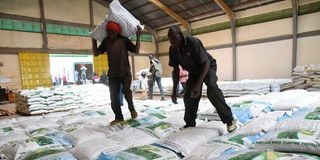Premium
State limits sale of cheaper fertiliser to 100 bags per farmer

Workers offload bags of fertiliser at the National Cereals and Produce Board depot in Eldoret, Uasin Gishu County.
Individual farmers will not be allowed to buy more than 100 bags of subsidised fertiliser, whose distribution the government has begun ahead of the short rains’ planting season.
The government has set aside Sh3.55 billion to subsidise 71,000 metric tonnes (1.42 million 50-kg bags) of fertiliser to boost food production.
The fertiliser is expected to support cultivation on about 1.4 million acres of land.
The Ministry of Agriculture says the National Cereals and Produce Board (NCPB) started distributing the low-cost fertiliser from its depots and sub-depots countrywide on Monday.
A 50kg bag of DAP will be selling at Sh3,500, CAN at Sh2,875 and UREA at Sh3,500.
NPK will be selling at Sh3,275, MOP at Sh1,775 and Sulphate of Ammonia at Sh2,220.
“Individual farmers will be entitled to a maximum of 100 50-kg bags of fertiliser,” said Crop Development acting Principal Secretary Francis Owino.
President William Ruto last week promised to cut fertiliser prices from Sh6,500 to Sh3,500 to lower the cost of farm inputs.
His predecessor Uhuru Kenyatta spent Sh3 billion to subsidise fertiliser in the April-to-June planting season and set aside Sh2.7 billion in the 2022/23 financial budget to lower the cost of the product ahead of the October planting season.
“The cost-of-living challenges are related to production. Our strategy to bring down the cost of living is empowering producers. The main cause of decline in production (of maize) is the high cost of inputs,” said President Ruto during his inauguration ceremony last week.
Maize prices have shot up sharply this year due to low local production and restricted imports, which had forced the Jubilee administration to roll out a Sh4 billion maize flour subsidy programme.
Dry conditions
Maize production declined by 12.8 per cent in 2021 from 42.1 million bags in 2020 to 36.7 million bags in 2021 due to prolonged dry conditions for parts of the year.
The subsidy lowered maize flour prices to Sh100 for a 2kg packet, down from Sh205. Maize flour prices have since increased again to about Sh215.
The government in July extended the importation of duty-free maize to September 30.
National Treasury Cabinet Secretary Ukur Yatani in May suspended import tax on maize to increase imports from outside the East African Community (EAC) in a bid to ease pressure on maize flour prices.
Kenya is a net importer of maize, a staple food in the country, but has traditionally restricted imports to cushion local maize farmers but at a cost to consumers, who are forced to pay a higher cost for maize.
Mr Yatani opened a three-month window for importers to bring in up to 540,000 metric tonnes of duty-free maize up to August 6, before extending the deadline in a gazette notice.





